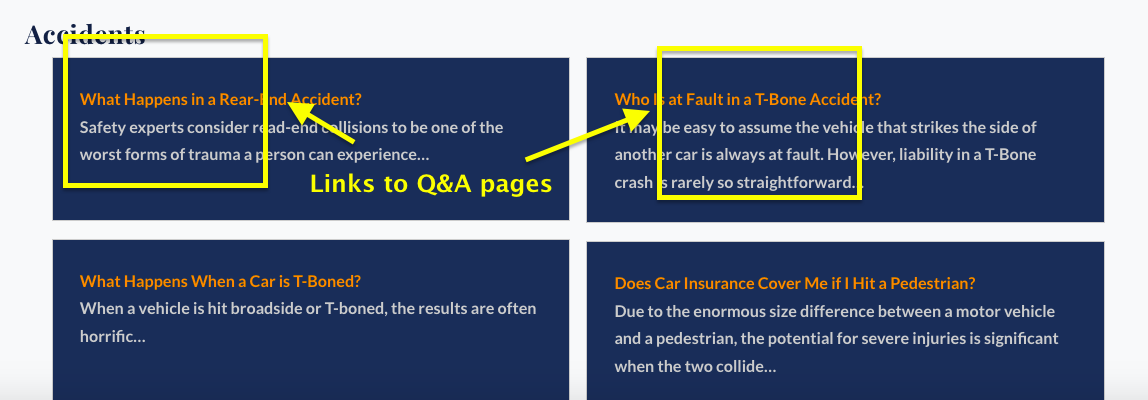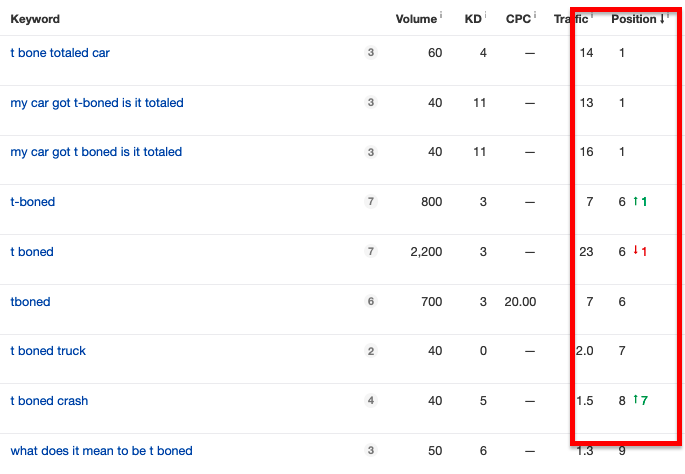FAQ pages seem like a very logical and simple type of content to publish on your business website.
The idea makes total sense – you list a bunch of questions that people ask, their experience improves, and you start getting traffic for those queries on Google.
Yet in terms of SEO FAQ pages are a bad idea.
When you are going after organic Google traffic, you need to plan your content carefully across website pages.
Relevance is essential in SEO.
In the eyes of Google, a page can be topically relevant to roughly one major topic. That is, an effective page that deserves to rank high and get clicks.
Considering that, trying to optimize a page for more that ±5 similar keywords is almost always counterproductive. However, that’s exactly what your standard FAQ page is – an attempt to fit many unrelated keywords into one page. Each of the questions frequently asked by your target audience is a keyword, no matter if you like it or not.
When you cram a bunch of questions into one page, the page is not answering any of them, according to Google. It may look good for visitors, but it means nothing for SEO (hence organic traffic, so… no visitors). FAQ page SEO is an oxymoron.
When can this work – in extremely low-competition niches where you’re literally one of 5-7 websites competing. It’s just not a viable strategy for anything more serious or rewarding.
FAQ on legal websites – the good & the bad:
Lawyers love doing this. Here’s an example of a FAQ page on a lawyer’s website:

See how all of the topics that could potentially become dedicated posts are published on just one page?
This FAQ page has a long list of completely diverse questions answered, and they are not related to each other.
As a result the page is not really optimized for any of these questions. It’s about everything and nothing. Google has absolutely zero reasons to display this page in results above other pages that are focused on each individual question separately.
What this business gets is a bunch of Page 4-5 rankings for great search phrases like this one:

Should you still target frequently asked questions?
Now, you absolutely need to target common questions within your content and SEO strategy. Almost all of the custom content plans we build for our clients include answers to common questions of their target market.
There’s a right way to go about it – list excerpts of questions on one page, and link them to answers on separate, small, dedicated pages.
Each of the individual Q&A pages targets just ONE question.
Here’s another example – also legal website but with a more effective FAQ page:

Note how there’s just an excerpt of each answer, and the actual question is the link to its’ individual dedicated answer page. That’s smart, because each Q&A gets an extra boost from this internal link anchor.
As a result the second site actually ranks for all the questions with their tightly focused, topically relevant individual question/answer pages.
What’s even better, because each of the question-answer pages is detailed, focused, and its’ topical relevance is maxxed out, they pick up more general, higher-traffic keywords:

With each lead in the legal industry being worth hundreds of dollars, is this type of traffic not worth the changing up your website a bit?
Check more attorney marketing tips here.
Objection – individual Q&A pages being too short?
First, this is not an issue if you are working with professional writers. There is a way to turn even a little topic into an all-round logical article without inflating the word count.
Second, it’s OK to have smaller articles answering questions. A 200-word page dedicated to answering just ONE question beats an all-in-one FAQ page all the time. As your site grows with content and links, several dozens of short and focused question-answer type posts will really start to make a difference.
FAQ page takeaways in terms of SEO
- Do not put multiple questions and answers on one page.
- By all means, target common questions of your target market – but with separate dedicated pages or posts!
- Having a list of your FAQs on one page is OK and gives an extra internal linking boost to them. Just don’t put a lot of answers’ text onto one page.
If you are having issues with this or want to figure out the best long-term strategy for planning out your website – reach out to us.

Pingback: Blogging for architects in 2022 - the complete starters guide